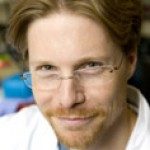Link to Pubmed [PMID] – 23897605
Infect. Immun. 2013 Oct;81(10):3757-69
Clostridium difficile is currently the major cause of nosocomial intestinal diseases associated with antibiotic therapy in adults. In order to improve our knowledge of C. difficile-host interactions, we analyzed the genome-wide temporal expression of C. difficile 630 genes during the first 38 h of mouse colonization to identify genes whose expression is modulated in vivo, suggesting that they may play a role in facilitating the colonization process. In the ceca of the C. difficile-monoassociated mice, 549 genes of the C. difficile genome were differentially expressed compared to their expression during in vitro growth, and they were distributed in several functional categories. Overall, our results emphasize the roles of genes involved in host adaptation. Colonization results in a metabolic shift, with genes responsible for the fermentation as well as several other metabolic pathways being regulated inversely to those involved in carbon metabolism. In addition, several genes involved in stress responses, such as ferrous iron uptake or the response to oxidative stress, were regulated in vivo. Interestingly, many genes encoding conserved hypothetical proteins (CHP) were highly and specifically upregulated in vivo. Moreover, genes for all stages of sporulation were quickly induced in vivo, highlighting the observation that sporulation is central to the persistence of C. difficile in the gut and to its ability to spread in the environment. Finally, we inactivated two genes that were differentially expressed in vivo and evaluated the relative colonization fitness of the wild-type and mutant strains in coinfection experiments. We identified a CHP as a putative colonization factor, supporting the suggestion that the in vivo transcriptomic approach can unravel new C. difficile virulence genes.

